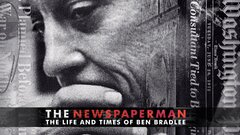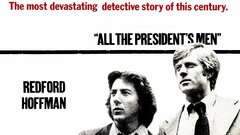Arguably one of the most recognized investigative journalists of the 20th century, Bob Woodward became legendary after just months on the job at the Washington Post when he and partner Carl Bernstein doggedly reported on the Watergate scandal in 1972. With the help of an unnamed source dubbed Deep Throat, the pair helped reveal a massive White House cover-up, which ultimately led to the resignation of President Nixon. They chronicled the events in their best-selling book, All the President's Men (1974), which was turned into an award-winning movie.
While Bernstein returned to daily reporting, Woodward became an investigative reporter capable of gaining access to high levels of government when others had failed. Throughout the years, he wrote a number of books that detailed behind-the-scenes decision-making during various presidencies, including Veil: The Secret Wars of the CIA, 1981-1987 (1987), which covered the covert wars of President Reagan, and The Agenda: Inside the Clinton White House (1994), which showcased President Clinton's fight for his economic recovery program. In the interim, Woodward investigated the life of John Belushi in his 1984 book, Wired.
In the next century, Woodward wrote four books on the wars of George W. Bush, starting with Bush at War (2002). Woodward remained an icon among journalists and one of the few who could claim to have pushed a sitting president out of office.
Born on March 26, 1943 in Geneva, IL, Woodward was raised by his father, Alfred, a former attorney who eventually became the Chief Judge of the 18th Judicial Court Circuit, and his mother, Jane. He grew up in the affluent Wheaton, IL, and eventually attended Yale University on a Naval Reserve Officer Training Corps scholarship, where he studied history and English literature, and joined the Phi Gamma Delta fraternity.
After graduating in 1965, Woodward spent the next five years in the U.S. Navy, serving as an officer on both the USS Wright and USS Fox before his discharge with the rank of lieutenant in 1970. He briefly considered a career in law, but instead applied for a reporter job at the The Washington Post while he began graduate coursework at George Washington University. Woodward was given a two-week trial, but failed to earn the job due to his lack of journalism experience. He did, however, find a position at the Montgomery Sentinel, a small, weekly paper in the Maryland suburbs. Following a year at the Sentinel, Woodward earned back his spot at the Post in 1971.
Just nine months after being hired on by the Washington Post, Woodward and veteran reporter Carl Bernstein were assigned to cover a burglary at the headquarters of the Democratic National Committee at the Watergate complex, which steered them toward one of the biggest political scandals in U.S. history that would end with the resignation of President Richard M. Nixon. Through their own reporting efforts and an FBI investigation, it was discovered that the burglars had been paid with a slush fund from the Committee to Re-elect the President. As the dominoes began to fall, members of Nixon's staff began testifying before the Senate against the committee - most notably White House Counsel John Dean - which led to revelations that Nixon had a recording system set up in the Oval Office that revealed he and his staff were deeply involved in a cover-up.
Meanwhile, Woodward and Bernstein doggedly pursued the story with the help of an anonymous contact of Woodward's they called Deep Throat - decades later revealed to be FBI agent Mark Felt - while the White House attacked them at every turn. Eventually, the dam broke and Nixon faced certain impeachment, leading to his resignation in August 1974. By that time, Woodward and Bernstein chronicled their experience in All the President's Men (1974), which was turned into an Oscar-nominated film directed by Alan J. Pakula in 1976 that starred Robert Redford as Woodward and Dustin Hoffman as Bernstein.
The reporting of Woodward and Bernstein resulted in a Pulitzer Prize for Public Service in 1973 for their newspaper. They collaborated on a follow-up novel, The Final Days (1976), which detailed the final months of the Nixon presidency, while both returned to regular reporting duties. Meanwhile, Nixon continued to rant against the reporters in public and private, most notably in his famous interviews with David Frost, though he refused to call them by name and stated that he would "never forgive them."
Woodward went on to collaborate with another Washington Post reporter, Scott Armstrong, on the book The Brethren (1979), which used his trademark off-the-record sources to give a detailed look behind the scenes of the U.S. Supreme Court during the reign of Chief Justice Warren Burger. He also delivered notable stories for the Post, including a 1977 piece about the CIA paying off King Hussein of Jordan and a 1982 story about covert operations in Nicaragua sanctioned by the United States.
For his next book, Woodward ventured westward to Hollywood with Wired: The Short Life and Fast Times of John Belushi (1984), which detailed the comedian's rise to popularity and sudden death from a drug overdose. Though he used named sources like singers James Taylor and Carly Simon and Belushi's co-stars and friends including Dan Aykroyd, Chevy Chase and Carrie Fisher. Many of the famous subjects interviewed post-publication felt that Woodward's account was exploitative and unrepresentative of the man they knew. Belushi's widow, Judy Jacklin, was particularly angry, as she had instigated the project and convinced many people to contribute their memories. Unfortunately, the straight-laced investigative reporter was more interested in facts - with the stark picture of drug abuse in Hollywood as the book's narrative theme, versus writing a portrait of the man. The book was later adapted into a 1989 movie starring Michael Chiklis that was both a critical and commercial failure, due in large part to Hollywood's collective efforts to squelch it.
For the remainder of his career, Woodward developed a reputation as a journalist who was able to become a fly on the wall for some of the country's biggest and most defining moments. Despite his ability to get the inside story, some accused Woodward of playing fast and loose with unnamed sources, while others feared he was a spokesman for presidents and policymakers looking to push a particular agenda.
In 1987, he published Veil: The Secret Wars of the CIA, 1981-1987, a bestseller that examined covert operations in Nicaragua, Afghanistan, Iran and Cambodia during the Reagan administration while also exploring the reign of CIA Director William J. Casey. He followed up with two more books, The Commanders (1991), which detailed the decision making of the first Bush administration in the lead up to the first Gulf War, and The Agenda: Inside the Clinton White House (1994), which highlighted the heated debates prior to President Bill Clinton implementing his economic recovery plan.
Woodward next wrote Shadow (1999), a 600-page tome that covered the major scandals of five successive presidents - Gerald Ford, Jimmy Carter, Ronald Reagan, George Bush and Bill Clinton - under the shadow of Watergate.
In 2002, Woodward won the Washington Post a Pulitzer Prize for National Reporting for six of 10 stories he wrote while covering the terrorist attacks of Sept. 11, 2001. Meanwhile, he published three successive books that covered the so-called "war on terrorism" during the administration of George W. Bush. The first was Bush at War (2002), an all-too-complimentary look inside the Bush White House in their response to the attacks and the subsequent War in Afghanistan. The second was Plan of Attack (2004), which detailed the reasons why Bush decided to wage war with Iraq and oust Saddam Hussein.
He concluded the trilogy with State of Denial: Bush at War, Part III (2006), a less than flattering look at the Bush administration's mismanagement of the War in Iraq that some felt influenced the eventual downfall of Defense Secretary Donald Rumsfeld. In between the second and third Bush books, Woodward delivered two hours of grand jury testimony to Special Counsel Patrick Fitzgerald in the Valerie Plame scandal, a revelation that was overshadowed after his old Watergate source, Deep Throat, revealed himself as FBI agent Mark Felt.
Woodward and Bernstein were back in the limelight, making the media rounds while recounting their days as intrepid reporters in search of the truth. Meanwhile, Woodward wrote a fourth Bush book, The War Within: A Secret White House History (2006-2008) (2008) that detailed tensions with the president implementing his surge strategy that employed 30,000 additional troops.
With a new administration in power, Woodward of course had a new book to publish, Obama's Wars (2010), which detailed President Barack Obama's decisions in Afghanistan, Pakistan and the worldwide fight against terrorism.










































